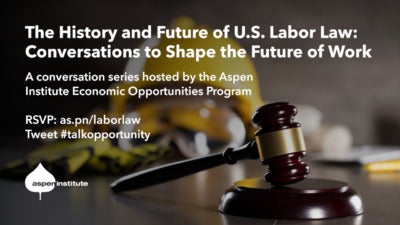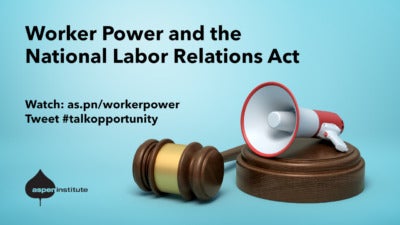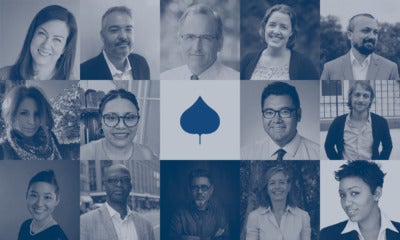At the Aspen Institute Economic Opportunities Program, and for our many colleagues and partners, the ongoing and intertwined health, economic, and racial justice crises bring new urgency to our work to improve access to quality jobs, options to participate in business ownership, and the freedom to pursue economic opportunity. Below we share our monthly newsletter with highlights of recent work. As always, we welcome your feedback, thoughts, and partnership in advancing inclusive opportunity and an economy in which we all can thrive. Click here to subscribe.
Click here to view past editions of our newsletter
Upcoming Events

The History and Future of U.S. Labor Law: Conversations to Shape the Future of Work
U.S. labor laws passed in the last 100 years improved job quality for millions of workers. But the power of these laws has since eroded, and the rights they once afforded workers have diminished. The future of work will be shaped by what we do now, just as the labor laws passed long ago influenced opportunity, employment, and workplaces today.
Join us for a five-part discussion series, The History and Future of U.S. Labor Law: Conversations to Shape the Future of Work, where we will learn about and reflect on the history of U.S. labor law, examine current implications and challenges, and discuss how we shape a future of work that provides opportunity and dignity to all.
- Part I: Worker Power and the National Labor Relations Act – March 16
- Part II: The Rewards of Work: Lessons from the Fair Labor Standards Act – April 7
- Part III: Title VII of the Civil Rights Act: Fulfilling the Promise of Equal Opportunity – April 27
- Part IV: The Occupational and Safety Health Act: The Past and Future of Workers’ Well-Being – May 4
- Part V: A Workers’ Bill of Rights: What We Want and How to Get There – May 26
Tweet The #futureofwork will be shaped by what we do now, just as the laws passed long ago influenced opportunity, employment, and workplaces today. Join @AspenJobQuality for a five-part series on the “History and Future of U.S. Labor Law.”

March 16: Worker Power and the National Labor Relations Act, Featuring U.S. Labor Secretary Marty Walsh
The last year has been filled with headlines of workers on strike and attempting to unionize. The roots of these efforts lie with workers in the 1800s and early 1900s who used strikes to protest low wages and poor working conditions. Those early labor movements contributed to the passage of the National Labor Relations Act (NLRA) of 1935, which gave workers the right to organize into unions and made it the official policy of the U.S. to encourage collective bargaining. Although union membership surged after its passage, the impact of NRLA waned over time and union membership has declined significantly. The law also excluded many of the occupations women and people of color worked in from the beginning, which still affects opportunities for millions of people today.
As we look to shape the future of work, what lessons can we learn from the NLRA’s history, impact, and effectiveness today? Join us for a discussion on Worker Power and the National Labor Relations Act. Our discussion includes opening remarks from U.S. Labor Secretary Marty Walsh, followed by a panel discussion with Roy Bahat (Bloomberg Beta), Jennifer Epps (The LIFT Fund), Dr. Annelise Orleck (Dartmouth College), and moderator Charisse Jones (USA Today). Click here to RSVP.
Tweet March 16: Worker Power and the National Labor Relations Act. Featuring @SecMartyWalsh @USDOL, @roybahat @BloombergBeta, Jennifer Epps (The LIFT Fund), @AnneliseOrleck1 @dartmouth, and @charissejones @USATODAY. Hosted by @AspenJobQuality.
News and Updates

Announcing the 2022-23 Class of Job Quality Fellows
This month we announced a new class of Job Quality Fellows, who will work together over the coming year to strengthen and expand the availability of high-quality jobs in our economy. This cohort of Fellows includes leaders with varied perspectives and backgrounds from across the country who will focus on the intersection between workforce development, worker organizing, and advocacy to advance workers’ interests and boost job quality. From “the Great Resignation” to pandemic upheavals and renewed unionization interest, this is a pivotal moment for collaborative action to confront the job quality crisis in the US. Learn more and meet the Fellows.
Tweet From strikes to union drives to the #GreatResignation, it’s clear that we need to improve #jobquality. The new @AspenJobQuality Fellows are committed to doing that—through workforce development, organizing, and advocacy.

We protect individuals from predatory lending practices — why not small businesses too?
As small businesses emerge from the pandemic, many will need new injections of financing. The question is whether this capital will support their growth and recovery or hinder it. When credit markets tightened after the Great Recession, predatory lenders stepped into the void, pushing high interest rates, unaffordable payments, and high-pressure collection tactics. These practices are likely to reemerge, targeting new small firms and those whose financials and credit were negatively impacted by the pandemic. The Responsible Business Lending Coalition—of which the Aspen Institute is a founding member—has been tracking these practices and advocating for policies that ensure small business financing is fair and responsible. Here’s what we wrote in The Hill.
Tweet Small businesses are critical to our economy, and they deserve the same basic standards of transparency and fairness that consumers now have. Let’s put in place the policies that will help them recover, not bury them deeper.

Financing the Small Business Recovery: 7 Key Facts and Challenges for 2022
The past two years have been a time of extraordinary change and challenges for small businesses and the community development financial institutions that finance them. Although the pandemic took a steep toll, today there are signs of resilience and optimism. The Business Ownership Initiative and its Microfinance Impact Collaborative held discussions with key funders, investors, and partners on their experiences and expectations. Here are seven key takeaways from these discussions.
Tweet The pandemic took a toll on small businesses, but today there are signs of resilience and optimism. These seven key facts and challenges will be key to meeting #smallbusiness credit needs.

Greater Phoenix Workforce Leadership Academy Fellows Present to Regional Stakeholders
The COVID-19 pandemic – along with the resulting employment crises and nationwide conversations challenging the status quo of race equity and job quality in the workplace – has created a unique opportunity to capitalize on new programs and funding available to address these issues. Recognizing this golden opportunity for change, the Greater Phoenix Workforce Leadership Academy Fellows presented their fine-tuned recommendations and calls to action to a diverse group of approximately 50 workforce leaders. The Fellows’ recommendations, a culmination of 10 months of research and collaboration, are related to developing a more cohesive workforce ecosystem, improving youth workforce navigation, equipping employers to attract and retain talent through a quality job lens, and promoting diversity, equity, and inclusion in the workplace. The local influencers in attendance, poised to act from different levers within the Greater Phoenix workforce ecosystem, ranged from individuals at the state level who directly implement service programs to members of a county-level workforce development board to representatives of a community-based nonprofit focused on improving literacy. Additionally, Fellows shared ways for stakeholders at all levels to get involved in work to advance their recommendations, which include (but are not limited to) a shared employer directory, annual workforce development conference, resource toolkit, and diversity, equity, and inclusion roundtable. Greater Phoenix’s workforce stakeholders had wonderful things to say about the February 24 event, such as: “Excellent information and very thoughtful approach to challenges in our workforce – thank you [F]ellows!” We couldn’t agree more. We’re excited to welcome the 20 Greater Phoenix WLA Fellows – now alumni – to the Aspen Institute’s Economic Opportunity Fellows Network!

Updates from UpSkill America
In upskilling news, Google announced a $100 million fund to boost access to its certificate program in underserved communities. UCHealth announced the launch of a new education benefit for employees, which will fully fund a selection of clinical certifications, foundational learning programs such as English language and college prep, and select degree programs in social work, behavioral health, and other areas. And Herschend Enterprises—the parent company of Dollywood, the Harlem Globetrotters, Silver Dollar City, and dozens of attractions across the US—announced it will cover 100% of tuition, fees, and books for employees enrolled in its new education program. We’re pleased to see companies remain committed to the upskilling movement during what continues to be an uncertain time in our economy and society. Stay tuned for more upskilling news, and contact us for information on how you can join the upskilling movement.
EOP On the Road
EOP staff are available for speaking and media engagements. Learn about our team and contact us for more information.

Shelly Steward Discusses the Future of (Food) Work on the Meat and Three Podcast
Future of Work Initiative Director Shelly Steward joined the Meat and Three podcast to discuss worker organizing in the food industry, including recent efforts by Starbucks employees. Shelly explains how Starbucks workers’ unionization efforts are noteworthy, as a nationally recognized brand in one of the largest and least unionized industries in our economy that disproportionately employs women and people of color. These are the types of jobs that need better and safer working conditions, and organizing efforts help address the inherent power imbalance between employers and workers, who are typically dependent on their wages to survive. Click here to listen.

Mohona Siddique Talks Portable Benefits on the Working Lunch Podcast
Senior Project Manager Mohona Siddique joined the Working Lunch podcast for a discussion on portable benefits. She and host Joe Kefauver discussed how portable benefits are advantageous for both workers and employers. Topics included the increasing importance of portable benefits in light of the pandemic and the changing economy, existing benefits models, and how cities across the country are tackling some of these issues head on. The Working lunch podcast includes a discussion on California’s FAST Act, which would establish a statewide council to set minimum standards on wages, hours, and working conditions. Click here to listen.

Natalie Foster Testifies to Congress on Ideas to Tackle Inequality
Future of Work Initiative Senior Fellow Natalie Foster spoke at a congressional hearing on “Bold Ideas to Alleviate Economic Disparity.” The event, hosted by the U.S. House Select Committee on Economic Disparity and Fairness in Growth, examined a range of ideas to tackle income and wealth inequality heightened by technological change, including social safety net policies, government-owned investment funds, and other large-scale proposals. Foster spoke alongside Dr. Yakov Feygin (Berggruen Institute), Solana Rice (Liberation in a Generation), and Palak Shah (National Domestic Workers Alliance), who is also a Job Quality Fellow. Click here to watch the discussion.

Yoorie Chang Talks Job Quality and “Building a Workplace for Every Employee”
Research Associate Yoorie Chang took part in a webinar on “Building a Workplace for EVERY Employee ~ A New Approach,” hosted by PHILLIPS Programs, the Aspen Institute, and Source America. The conversation explored what high-quality jobs are and why a new approach is needed. Chang spoke alongside Shane Kanady (Source America), Lindsay Harris (PHILLIPS Programs), and moderator RoseAnn Renteria (PHILLIPS Programs). We’re pleased to share a recording of the discussion. Click here to watch.
Join the conversation
Follow EOP on social media to join the conversation!
-Job quality updates from EOP @AspenJobQuality
-Business Ownership Initiative @Aspen_BOI
-UpSkill America @upskillamerica
-Future of Work Initiative @AspenFutureWork
About EOP
The Aspen Institute Economic Opportunities Program (EOP) advances strategies, policies, and ideas to help low- and moderate-income people thrive in a changing economy. We recognize that race, gender, and place intersect with and intensify the challenge of economic inequality and we address these dynamics by advancing an inclusive vision of economic justice. For over 25 years, EOP has focused on expanding individuals’ opportunities to connect to quality work, start businesses, and build economic stability that provides the freedom to pursue opportunity. For more information, visit as.pn/eop.
EOP has several initiatives, including the Business Ownership Initiative, Workforce Strategies Initiative, UpSkill America, Good Companies/Good Jobs, and the Future of Work Initiative. In addition, across these approaches EOP hosts the Economic Opportunity Fellows Network and the Opportunity in America event series.
Thank you to our many partners and funders for supporting our efforts.
Support Our Work
We are committed to making our events and publications freely available to everyone who finds them useful. But if you find value in our work and are able to support it, please consider making a tax-deductible donation. Click here to learn more.
Keep in Touch
Click here to join our mailing list. For updates every day, follow us on social media.

